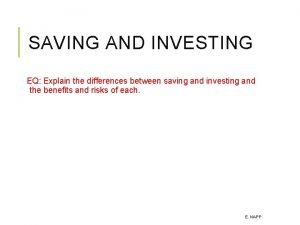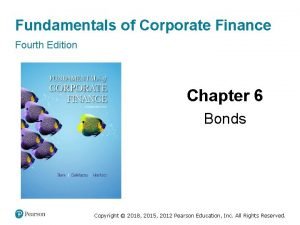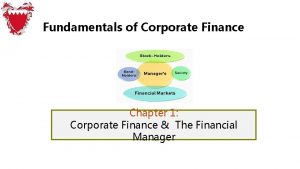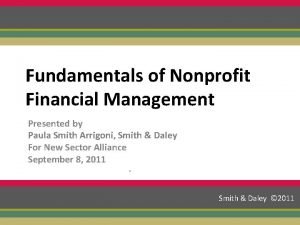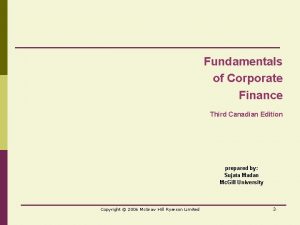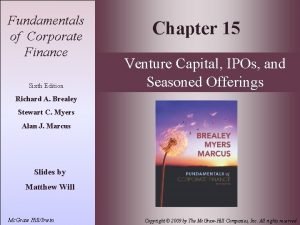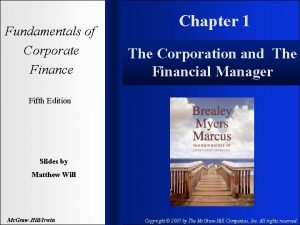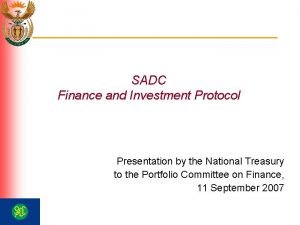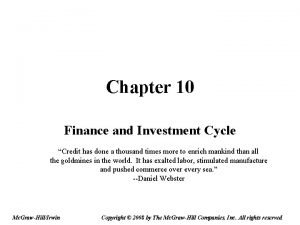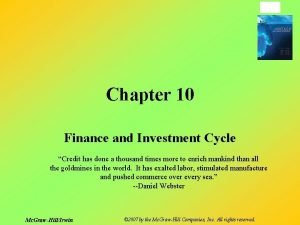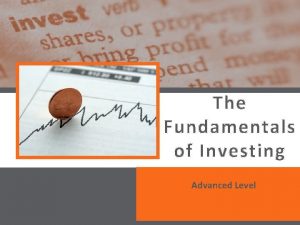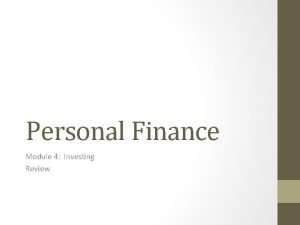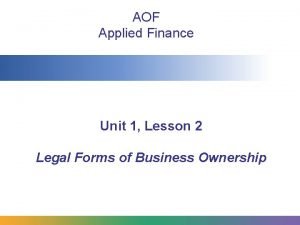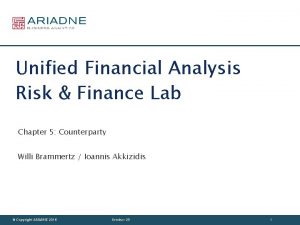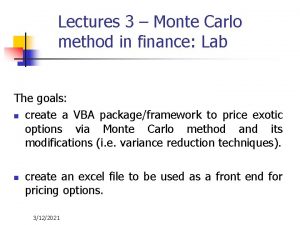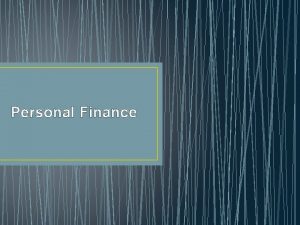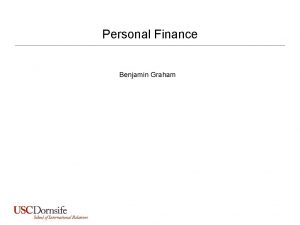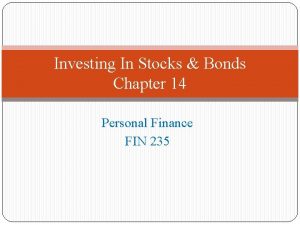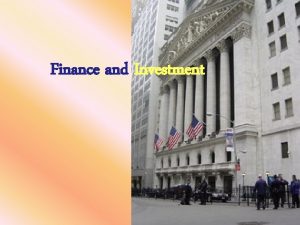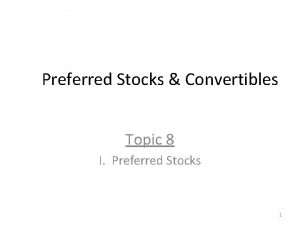Personal Finance Investment Fundamentals Agenda Investment fundamentals Stocks




































- Slides: 36

Personal Finance: Investment Fundamentals

Agenda • Investment fundamentals • Stocks • Bonds • Mutual funds

Investment fundamentals • • What is investing? • Making money from personal savings Where do I get the extra money to invest? • • • 1. Break a bad-habit 2. participate in an employers retirement plan 3. Cut back on entertainment and food 4. Automatic savings 5. Part-time job – slide 1

Investment fundamentals - slide 2 • If someone smokes 4 packs of cigarettes per week at $6 per pack, cutting the habit in half would save how much per month? Per year? • If someone visits the bar 2 times per week and spends $25 per visit, cutting back to one visit per week would save how much per month? Per year?

Investment fundamentals • Common investment terms: • • Securities Stocks Bonds Portfolio Interest Capital gain Yield (rate of return)

Diversification –slide 1 • Random risk vs Diversification • Random risk – owning one or few investments • • High risk Diversification – spreading money through several investment opportunities • Reduced risk

Diversification – slide 2

Diversification Averages out an investor’s return

Asset Allocation –slide 1 • Asset Allocation • Form of diversification in which the investor decides on the proportions of the investment portfolio that will be devoted to various assets.

Asset Allocation –slide 2 • A portfolio should be a mix of: • 1) Stocks or stock mutual funds (equities) • • 2) Bonds (debt) • • Highest risk, highest yield Low risk, low/moderate yield 3) Cash or cash equivalents (such as Treasury Securities) • lowest risk, lowest yield

Asset Allocation – pie charts

Asset Allocation: Rebalancing Assets • Should rebalance asset allocations every 5 -10 years!!

Asset Allocation • Asset Allocation Rules of Thumb: • The percent to invest in equities is 110 - (age) x 1. 25 • If you are 40 years old, here is the formula: • 110 -40*1. 25= % to invest in stocks • 87. 5%

Stocks • What is a stock? • Part ownership of a company • What do stockholders typically expect? • • 1. Cash dividends 2. Value of stock to increase over time

Stocks – Purchasing Basic • Here a some basic principles for purchasing stocks: • 1. Timing, timing!!!! • • 2. Understand your company • • • Buy at low prices, sell high at high prices Research your company Stock performance history 3. Be aware of economic trends

Purchasing Stocks • Where can I research stocks: • • • Search engines (Yahoo Finance, Google) Big Newspapers (New York Times, Wall Street Journal) Link to Market. Watch website Review Security Market Indexes Company Annual Reports – slide 1

Purchasing stocks • Let’s research a stock: • Market Watch. com - Link to Market. Watch website – slide 2

Screenshot of Money Market Watch for Mc. Donald's Stock

Purchasing Stocks – Market Indexes • Make sure to look at Security Market Indexes • DOW Jones Industrial (most widely reported of all indexes) • • S&P 500 Index (Standard and Poor’s) • • 65 top stocks in industrial, transportation, and utility companies Top 500 companies in US NASDAQ Index • Includes virtually ever US stock

Purchasing Stocks – where? • Where can I purchase stocks? • 1. Discount brokers • • 2. Online Brokers • • Fidelity, TD Ameritrade, Charles Schwab, USSA Brokerage, Vanguard E*Trade, Scott Trade 3. Full service Brokerage Firms • Edward Jones, Wells Fargo, Morgan Stanley, UBS, T. Rowe Price

Bonds • Investment grade • Reasonably certain principle and interest will be paid • Speculative grade (junk bonds) • Riskier than investment grade, but better earning potential

Bond Ratings

Bank Credit Ratings

Country Credit Ratings by Moody’s, S & P, and Fitch

Bonds • – types Types of bonds: • • • 1. Corporate Bonds • State law requires corporations pay bond payments on time, a given priority over other financial obligations 2. Government bonds • Very safe, high quality 3. Municipal bonds • • Tax-free on interest for federal returns!! Lower interest rates, but good overall returns due to tax-exempt status

Government Bonds • T-bills, notes or bonds • Treasury Inflation-Protected Securities (TIPS) • Savings Bonds • • Series I Bonds Series EE Savings bonds

Purchasing Bonds • Where can I buy bonds? • Corporate: Link to a website to buy and sell bonds, Link to a website to buy bonds • Government: banks, brokers or direct from Treasury • Link to a website to buy treasury bonds

Mutual Funds – slide 1 • What are a mutual funds? • An investment program that pools funds from shareholders and invests in a diversified portfolio by professional investment managers

Mutual Funds – slide 2 What are the advantages to owning mutual funds? • Diversified investments • Affordable • Professionally managed • Liquidity • Low transaction costs • Uncomplicated investment choices

Mutual funds • 2 common objectives of Mutual funds • • 1. Income 2. Growth –slide 3

Mutual Funds • Common type’s of growth funds: • • 1. Growth 2. Value 3. Aggressive 4. Specific • • Large-cap; mid-cap; small-cap Sector Funds Global or international funds Index - slide 4

Mutual funds • Where do I invest in a mutual fund? • • • Funds companies Retirement plans Brokers, financial planners – final slide

Retirement Saving • Social Security retirement benefits • Supplemental retirement income

Questions • Robert Caldwell • • • South Omaha Campus, ITC 100 402 -738 -4771 rcaldwell 11@mccneb. edu

Additional Information

Additional Information 2
 Explain the investment poem concerning stocks and bonds.
Explain the investment poem concerning stocks and bonds. Agenda sistemica y agenda institucional
Agenda sistemica y agenda institucional Fundamentals of corporate finance chapter 6 solutions
Fundamentals of corporate finance chapter 6 solutions Fundamentals of corporate management
Fundamentals of corporate management Finance fundamentals for nonprofits
Finance fundamentals for nonprofits Fundamentals of corporate finance 3rd canadian edition
Fundamentals of corporate finance 3rd canadian edition Real estate finance fundamentals
Real estate finance fundamentals Fundamentals of corporate finance canadian edition
Fundamentals of corporate finance canadian edition Fundamentals of corporate finance fifth edition
Fundamentals of corporate finance fifth edition Corporate finance 6th edition
Corporate finance 6th edition Fundamentals of corporate finance, chapter 1
Fundamentals of corporate finance, chapter 1 Sadc protocol on finance and investment
Sadc protocol on finance and investment Financing and investing cycle
Financing and investing cycle Investment banking activities
Investment banking activities Investing cycle in auditing
Investing cycle in auditing Take charge today the fundamentals of investing
Take charge today the fundamentals of investing Fixed investment and inventory investment
Fixed investment and inventory investment The basic rule of a risk-to-return relationship is that …
The basic rule of a risk-to-return relationship is that … Chapter 2 personal finance
Chapter 2 personal finance Personal finance gcse
Personal finance gcse Mypersonalfinancelab
Mypersonalfinancelab Unit 3 finance btec business
Unit 3 finance btec business Personal finance lab
Personal finance lab Llc advantages and disadvantages
Llc advantages and disadvantages Personal finance lab
Personal finance lab Personal life cycle stages finance
Personal life cycle stages finance Personal finance lab
Personal finance lab Personal finance 6th edition
Personal finance 6th edition Personal finance bell ringers
Personal finance bell ringers Personal finance assignment
Personal finance assignment Personal finance lab
Personal finance lab Introduction to personal finance
Introduction to personal finance Foundations in personal finance chapter 1 test
Foundations in personal finance chapter 1 test Chapter 8 personal finance
Chapter 8 personal finance Principles of business and finance unit 1 test
Principles of business and finance unit 1 test Personal finance unit 1 review
Personal finance unit 1 review Chapter 4 review personal finance
Chapter 4 review personal finance
